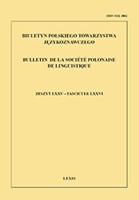Niejednoznaczność terminów tematyczny i atematyczny w językoznawstwie indoeuropejskim
Ambiguity of the terms thematic and athematic in Indo-European linguistics
Author(s): Kamil PawlickiSubject(s): Morphology, Sociolinguistics, Western Slavic Languages
Published by: Polskie Towarzystwo Językoznawcze
Keywords: Thematic; athematic; Proto-Indo-European; thematic vowel; stem morpheme;
Summary/Abstract: The Polish terms tematyczny (‘thematic’) and atematyczny (‘athematic’) are used to describe nominal and verbal inflection of the Proto-Indo-European language and of the older phases of some individual Indo-European languages. In the first sense, the term atematyczny is used for formations whose stem morpheme is zero – that is, in which the lexical part is followed directly by the inflectional ending, while the term tematyczny is used for formations in which the stem morpheme is different from zero. In the second sense, the term tematyczny is used for formations that just before the ending have a thematic vowel, which is usually understood as PIE. *-e/o- (sometimes also as *-ā-), while the term atematyczny is used for formations that do not have this vowel. Some formations are thematic or athematic in both meanings (e.g. PIE. *dóm(H)-Ø-s ‘house’), and some are labelled as athematic only in the second meaning, but not in the first one (e.g. PIE. *dóm(H)-u-s ‘house’). Justifications for the first meaning can be found in Proto-Indo-European verbal inflection, in which there are few formations with a stem morpheme other than * -e/o-. Justifications for the second meaning are some differences in the inflection of formations with the *-e/o- morpheme and without it. The ambiguity in the understanding of the terms tematyczny and atematyczny in Polish may be indirectly due to the fact that both terms with which they are associated – morfem tematyczny (‘thematic morpheme’) and samogłoska tematyczna (‘thematic vowel’) – come from the same term temat ‘theme’; the ambiguity is less e.g. in English, where analogous terms come from two different basic terms: stem (hence stem suffix or stem morpheme) and theme (hence thematic vowel).
Journal: Biuletyn Polskiego Towarzystwa Językoznawczego
- Issue Year: LXXVI/2020
- Issue No: 76
- Page Range: 133-143
- Page Count: 11
- Language: Polish

